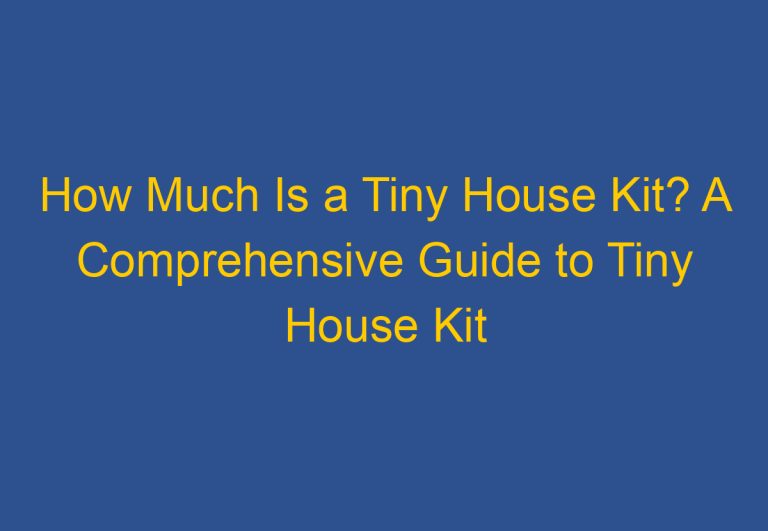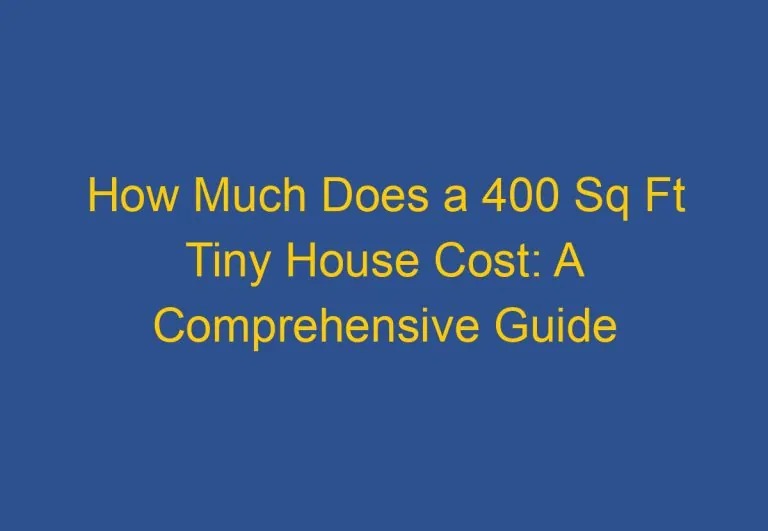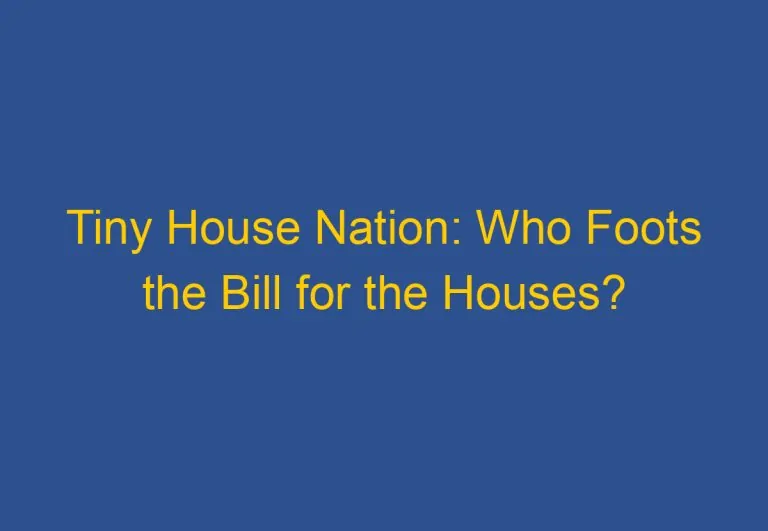Where Can You Put a Tiny House in New Jersey: A Guide to Zoning and Regulations
Tiny houses have become increasingly popular in recent years, as more people seek out affordable and sustainable housing options. New Jersey is no exception to this trend, with many residents interested in the tiny house movement. However, those looking to live in a tiny house in New Jersey may wonder where they can legally place their home.
Fortunately, tiny houses are legal in New Jersey, and there are several communities throughout the state that offer unique and sustainable living experiences. However, it’s important to follow local building codes and regulations when building a tiny house in New Jersey to ensure the safety and compliance of the structure.
In this article, we’ll explore where you can legally place a tiny house in New Jersey, including information on building codes, zoning laws, and tiny house communities throughout the state. Whether you’re looking to build your own tiny house or join an existing community, this guide will provide you with the information you need to make an informed decision about where to place your tiny home in New Jersey.
Understanding New Jersey’s Tiny House Regulations
Zoning and Building Codes Compliance
When it comes to tiny house regulations in New Jersey, zoning and building codes compliance is an essential aspect to consider. Local zoning laws and regulations are critical to follow when placing a tiny house in the Garden State. In addition, it’s crucial to ensure that the tiny house complies with the International Residential Code (IRC) and the Appendix Q of the 2018 International Residential Code.
To comply with the IRC, the tiny house must meet specific requirements, such as the minimum height of the habitable space, ceiling height in bathrooms, toilet rooms, and kitchens, and other safety requirements. Furthermore, the tiny house must comply with the local zoning laws and regulations, such as the zoning permit and building permit, to avoid any legal issues.
Location and Placement Options
New Jersey has specific location and placement options for tiny houses. The tiny house can be placed in an RV park, tiny house community, or even on a residential property. However, it’s essential to ensure that the tiny house complies with the local zoning laws and regulations for the specific location.
In addition, it’s vital to consider the entity identification number, lien holder, and other legal requirements to avoid any legal issues. Furthermore, it’s crucial to ensure that the tiny house is placed in a safe and secure location, away from any potential hazards.
Legal Requirements for Tiny Houses on Wheels
Tiny houses on wheels (THOWs) have specific legal requirements in New Jersey. The THOW must comply with the RV laws and regulations, such as the Motor Vehicle Agency (MVC) regulations and the Manufacturer’s Certificate of Origin (MCO). In addition, the THOW must have proper identification, such as a license plate and registration.
Furthermore, it’s essential to ensure that the THOW complies with the local zoning laws and regulations, such as the zoning permit and building permit. It’s also crucial to consider the safety requirements and other legal requirements for THOWs, such as the entity identification number and lien holder.
In conclusion, understanding New Jersey’s tiny house regulations is critical to avoid any legal issues and ensure a safe and secure living environment. By complying with the local zoning laws and regulations, building codes, and safety requirements, tiny house owners can enjoy a comfortable and sustainable lifestyle in the Garden State.
Design and Construction Standards for Tiny Homes
Space and Size Requirements
When building a tiny home in New Jersey, it is important to consider the space and size requirements set by the state. The habitable space on the hallways of tiny houses must have a minimum height of 6 ft 8 in. The ceiling height in bathrooms, toilet rooms, and kitchens can’t be less than 6 ft 4 inches. For lofts, it is possible to have ceiling heights of less than 6 ft 8 inches. The living area, bedroom, and kitchen should be designed to maximize the available space while ensuring that the area remains functional.
The state of New Jersey requires that tiny homes have a minimum floor area of 150 square feet and a maximum floor area of 400 square feet. It is important to note that the floor area does not include loft area. The loft area can be used for sleeping or storage purposes.
Safety Features and Building Components
Safety regulations should be considered when designing and constructing a tiny home in New Jersey. Emergency exit and rescue openings should be installed in all sleeping areas and loft areas. Stairways leading to the loft should be safe and secure, and loft guards should be installed to prevent falls.
Ventilation is also important in tiny homes. Adequate ventilation should be installed in the kitchen and bathroom areas to prevent moisture buildup and mold growth. Additionally, all tiny homes should be equipped with smoke detectors and carbon monoxide detectors.
Utilities and Systems Integration
When building a tiny home in New Jersey, it is important to consider the integration of utilities and systems. The septic system should be designed to handle the waste generated by the tiny home. Composting toilets are a popular option for tiny homes as they are environmentally friendly and do not require a septic system.
Electrical and plumbing systems should be designed to meet the needs of the tiny home. City water and sewer lines can be connected to the tiny home if it is located in an area where these services are available. Solar panels can be installed to reduce utility expenses.
Overall, when building a tiny home in New Jersey, it is important to follow the state’s regulations and guidelines to ensure the safety and functionality of the structure. Tiny house builders should work with experienced professionals to ensure that the components and systems are integrated properly.
Frequently Asked Questions
Are there specific zoning regulations for tiny houses in New Jersey?
Yes, there are specific zoning regulations for tiny houses in New Jersey. The state’s Uniform Construction Code sets minimum construction standards for safety and durability, and local zoning laws and building codes may vary. Typically, tiny houses must be built on a foundation and meet minimum square footage requirements. It is important to research local regulations before beginning construction on a tiny house in New Jersey.
What are the legal requirements for establishing a tiny house community in NJ?
To establish a tiny house community in New Jersey, you must comply with the state’s zoning and land use regulations. This includes obtaining any necessary permits and approvals from local authorities. It is important to research local regulations before beginning the process of establishing a tiny house community in New Jersey.
How does New Jersey classify tiny houses in terms of housing and building codes?
In terms of housing and building codes, New Jersey classifies tiny houses as accessory dwelling units (ADUs). ADUs are defined as self-contained living units within a single-family home or on the same lot as a single-family home. They must comply with the state’s Uniform Construction Code and local zoning laws and building codes.
Can tiny houses be placed on private land in New Jersey without special permits?
No, tiny houses cannot be placed on private land in New Jersey without special permits. Local zoning laws and building codes may require permits for construction and placement of a tiny house on private land. It is important to research local regulations before beginning construction on a tiny house in New Jersey.
What are the options for legally renting a tiny home in New Jersey?
There are several options for legally renting a tiny home in New Jersey. One option is to rent a tiny home from a private owner or through a rental company that specializes in tiny homes. Another option is to rent a space in a tiny house community.
Do municipalities in New Jersey have unique ordinances affecting tiny house placement?
Yes, municipalities in New Jersey may have unique ordinances affecting tiny house placement. It is important to research local regulations before beginning construction on a tiny house in New Jersey. Some municipalities may have specific requirements for the placement of tiny houses, such as minimum setbacks or lot size requirements.










